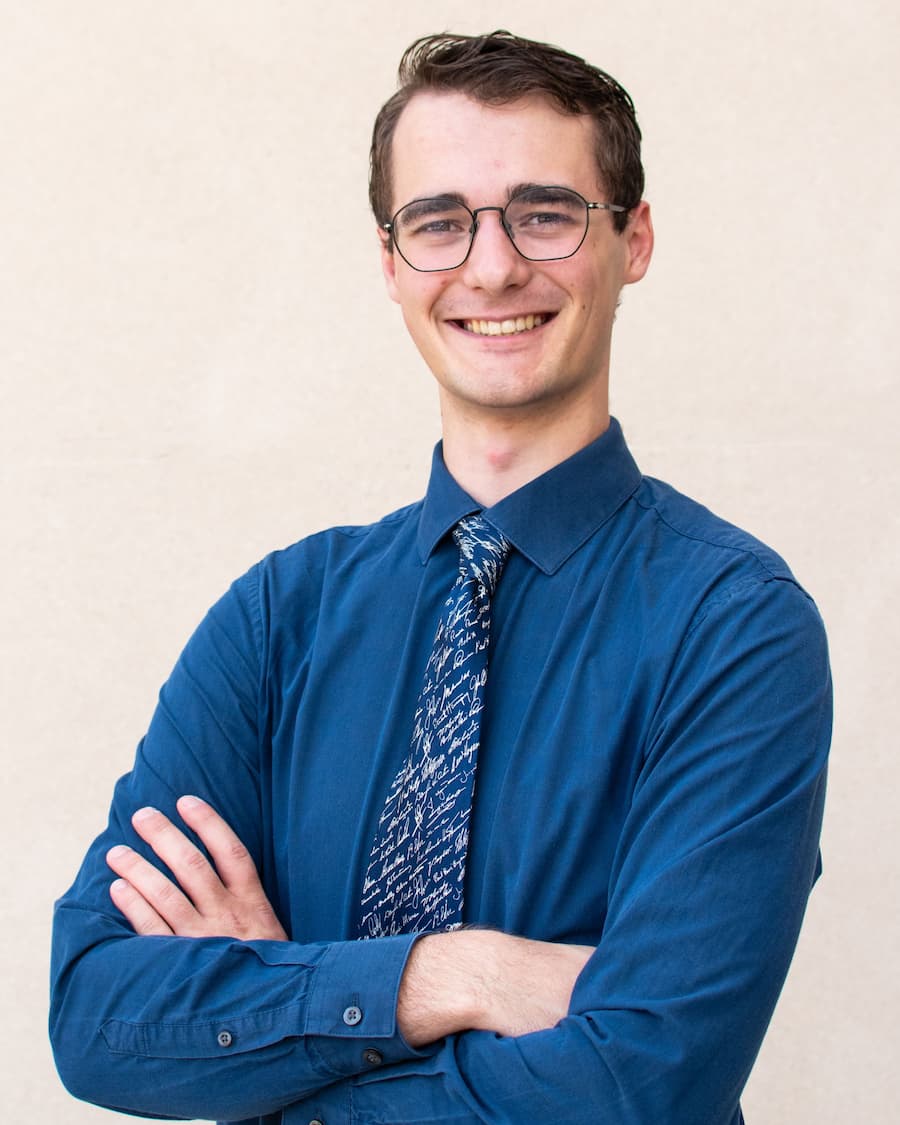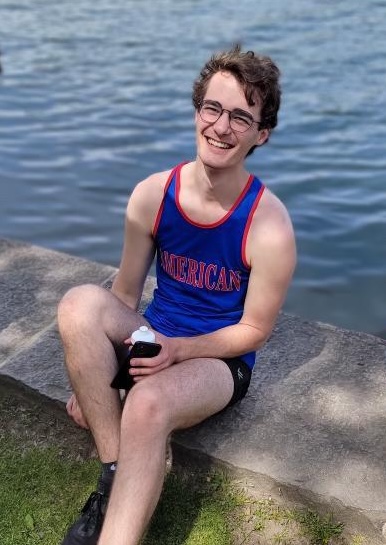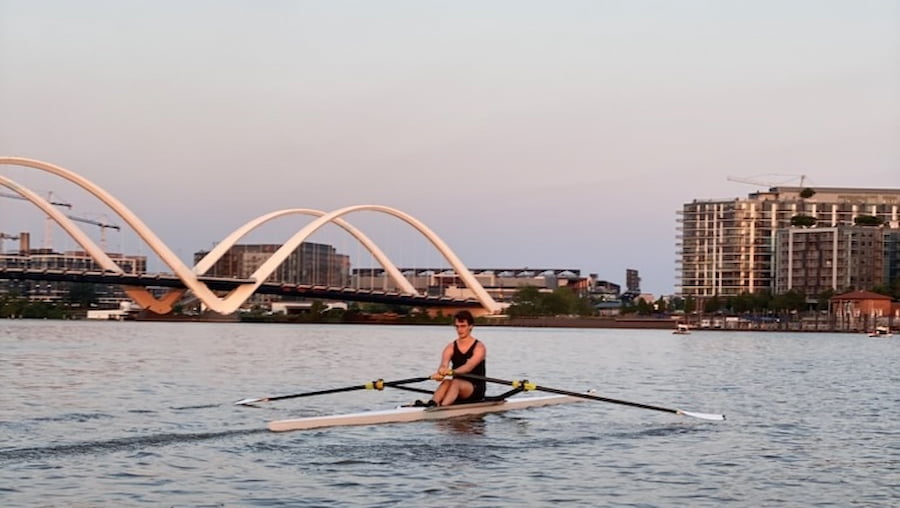Meet Collin Coil, Undergrad Student Commencement Speaker
 On Saturday, May 11, Collin Coil will stand at Bender Arena’s podium at the 147th Commencement to represent the College of Arts and Sciences’ undergraduate Class of 2024.
On Saturday, May 11, Collin Coil will stand at Bender Arena’s podium at the 147th Commencement to represent the College of Arts and Sciences’ undergraduate Class of 2024.
Collin is graduating with a dual degree in Mathematics and Data Science, a minor in Economics, and an Applied Statistics certificate. He earned a 4.0 GPA, Honors in Mathematical Sciences, and a spot in AU Honors Program. He worked as a research fellow, a research intern, a lab assistant, and assistant to faculty members across the College, Kogod, and School of Public Affairs. He is a certified Volunteer Income Tax Assistance volunteer, member of the AU Rowing Team, and chair of the College of Arts and Sciences Dean's Student Advisory Council.
"Collin's dedication to academic excellence and service to our university community exemplifies the spirit of leadership we cultivate at American University,” says College of Arts and Sciences Dean Linda Aldoory. “His exceptional achievements across multiple disciplines, coupled with his engagement on the Dean's Student Advisory Council, underscore his commitment to advancing knowledge and supporting his peers. Collin has made a real impact on our campus, and I am looking forward to following his academic career and hearing about his future successes.”
Four Years of Highlights
During his time at American University, Collin has taken advantage of nearly every academic experience offered to him, which has prepared him well for his next pursuit, a PhD in Complex Systems and Data Science at the University of Vermont.
He says that one of the highlights of his time at American University was his work as a research fellow at the AU Center for Data Science, harnessing the power of machine learning to tackle challenges across diverse fields. As a fellow, Collin collaborated with diverse stakeholders to develop innovative AI solutions, leading discussions on AI governance, algorithmic fairness, and building trustworthy AI systems. The expertise he gained during his time at American University spans reinforcement learning, deep learning, and large language models, leading to groundbreaking publications in cheminformatics, finance, political science, and theoretical machine learning.
Collin participated in a range of academic experiences across the university, including roundtable discussions on AI's role in tax agency modernization, which were hosted by AU's Kogod Tax Policy Center and IBM's Center for the Business of Government. “Not only did I get to meet IRS Commissioner Daniel Werfel, but I also got to interact with tax agency leaders from around the world,” he says.
 Collin also sought out opportunities beyond the university. During his junior year, he traveled to Wisconsin for the National Conference for Undergraduate Research to present a paper focused on his summer research funded by the School of Public Affairs' Public Affairs and Policy Lab. “I took advantage of the trip to indulge in as much fresh Wisconsin cheese as I could!” he says.
Collin also sought out opportunities beyond the university. During his junior year, he traveled to Wisconsin for the National Conference for Undergraduate Research to present a paper focused on his summer research funded by the School of Public Affairs' Public Affairs and Policy Lab. “I took advantage of the trip to indulge in as much fresh Wisconsin cheese as I could!” he says.
Collin also looks back fondly at all the social opportunities at AU, such as night monumenting with the AU Rowing Team. “Every year, the rowing team starts its season by taking the novices to see the monuments,” he says. “This trip is a great way to get to know the new members of the team and introduce the freshmen to the city.” He also has great memories of Math Department events, including dressing up as his favorite professors for Halloween and laughing at the annual April Fool’s Day lecture.
Publishing for Real-World Impact
One of the most impactful things he accomplished during his time at AU, says Collin, was getting published. “The biggest highlight about being published is discoverability of my research,” he explains. “This is critically important to ensure that stakeholders can act on my findings. Since much of my work has revolved around Congress, getting published means that Congress is able to read and respond to my research.”
For example, one of Collin’s research groups, led by Professors Caroline Bruckner (Kogod School of Business) and Karen O'Connor (School of Public Affairs), convinced Congress to improve tracking of demographic diversity in their witnesses. “In a paper I wrote with the team, we discovered that Congress's change, motivated by our research, led to greater than a seven percent increase in the chance women get called to testify,” Collin says. “Being able to research the impact of my team's proposals is very rewarding as it demonstrates that our work produces measurable changes. The paper containing that finding is published in the Journal of Women, Politics and Policy, and it also explores the driving factors behind women's representation in Congressional witness panels.
Collin has several other papers with this group currently under peer review or in development. In these papers, he brings more sophisticated mathematics and machine learning tools to advance the study of congressional witnesses. But he points out that his research works aren't limited in scope to Congress. “I also have done work developing machine learning algorithms for change point detection and using neural networks for multi-modal data fusion,” he says. “I revel in the opportunity to push the boundary of theoretical and applied machine learning.”
What’s Next? And a Bit of Advice
At the University of Vermont, Collin has been selected for the university’s inaugural Presidential Doctoral Fellowship. “This award provides me with the support necessary to continue my high impact and cutting-edge research as I work toward my doctoral degree,” he says.
This research will begin at the university’s Neurobotics lab. “My work will revolve around the ‘lottery ticket’ hypothesis. This is the idea that huge neural networks are effective because they contain a much smaller subnetwork driving its performance,” he explains. “The key to winning the ‘lottery’ is identifying this subnetwork and getting rid of the rest of the neural network that is irrelevant. This has major implications for the future of artificial intelligence since reducing neural network size will significantly reduce costs, network training time, energy consumption, and training data needed without sacrificing any of the network's performance.”
As he looks forward to this new beginning, he has some words of advice for future American University students. “You are more than your failures,” he says. “Over my four years at AU, I have been rejected from internships, awards, and graduate schools. Sometimes, these rejections can be frustrating, especially when the feedback you receive isn't helpful to grow. However, these rejections do not define you. Keep going because all it takes is one ‘yes’ to break through.”

